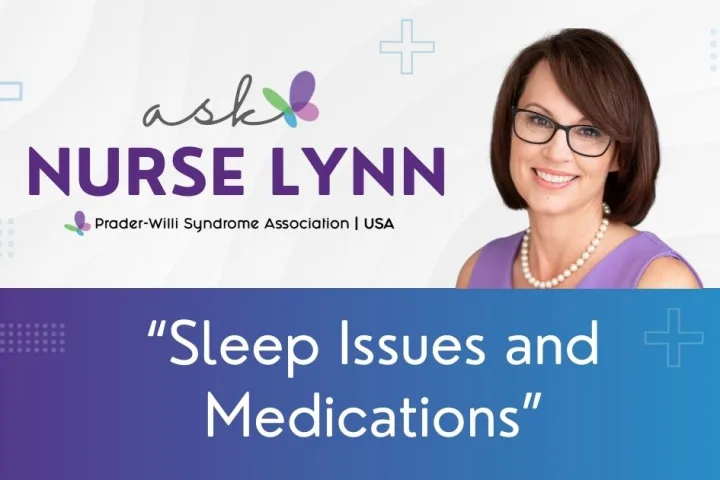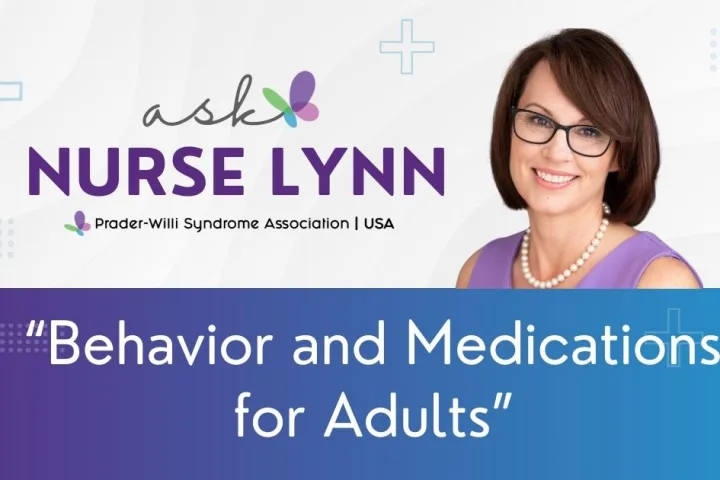Question:
Female, 7 years old, Unknown deletion
Does the identification of PWS by genetic testing PWS give conclusive results? In other words, your child either has or doesn’t have PWS?
Does a child with PWS gain weight event if her caloric intake is restricted? Would a “less than normal” caloric intake still result in weight gain?
Nurse Lynn’s Response:
Yes, genetic testing for PWS is conclusive —There’s no ambiguity: a child either has the specific genetic abnormality that causes PWS or they do not.
Yes, a child with PWS can still gain weight even on a calorie-restricted diet, and here’s why:
1.Extremely Low Metabolic Rate
Children with PWS have a significantly lower resting energy expenditure (REE) than other children their age and size. Their bodies burn fewer calories at rest, meaning:
- -Even a diet that seems “low calorie” by standard guidelines may be too much for their unique metabolic needs.
- -Some children may need 25–30% fewer calories than typical children to maintain or lose weight.
2.Body Composition
- -Low muscle mass (which burns more calories).
- -Higher fat mass, which burns fewer calories. This imbalance further lowers calorie needs and contributes to easier weight gain.
3.Hormonal and Genetic Factors
- -Hypothalamic dysfunction affects hunger, satiety, and metabolism.
- -Growth hormone deficiency, common in PWS, contributes to lower muscle mass and higher fat storage.
- -Hormonal imbalances can make fat loss and weight control much harder.
4.Food Seeking and Behavior
Even with strict controls, children with PWS may:
- -Find hidden food, sneak food, or consume inedible substances (hyperphagia-related behaviors).
- -Struggle with rigid food rules, leading to behavioral challenges that can result in extra or unintended calorie intake.
Resources:
https://www.pwsausa.org/wp-content/uploads/2022/12/Nutrition-Adolescence-Adult-Revised-Aug-2022.pdf
https://www.pwsausa.org/wp-content/uploads/2022/12/NUTRITIONAL-PHASES.pdf
https://www.youtube.com/watch?v=-BtFDfPLonw
https://ipwso.org/information-for-families/dietary-management/
Do you have a non-emergency medical question for Nurse Lynn? Submit your question here:
Share this!





 Perry A. Zirkel has written more than 1,500 publications on various aspects of school law, with an emphasis on legal issues in special education. He writes a regular column for NAESP’s Principal magazine and NASP’s Communiqué newsletter, and he did so previously for Phi Delta Kappan and Teaching Exceptional Children.
Perry A. Zirkel has written more than 1,500 publications on various aspects of school law, with an emphasis on legal issues in special education. He writes a regular column for NAESP’s Principal magazine and NASP’s Communiqué newsletter, and he did so previously for Phi Delta Kappan and Teaching Exceptional Children. Jennifer Bolander has been serving as a Special Education Specialist for PWSA (USA) since October of 2015. She is a graduate of John Carroll University and lives in Ohio with her husband Brad and daughters Kate (17), and Sophia (13) who was born with PWS.
Jennifer Bolander has been serving as a Special Education Specialist for PWSA (USA) since October of 2015. She is a graduate of John Carroll University and lives in Ohio with her husband Brad and daughters Kate (17), and Sophia (13) who was born with PWS. Dr. Amy McTighe is the PWS Program Manager and Inpatient Teacher at the Center for Prader-Willi Syndrome at the Children’s Institute of Pittsburgh. She graduated from Duquesne University receiving her Bachelor’s and Master’s degree in Education with a focus on elementary education, special education, and language arts.
Dr. Amy McTighe is the PWS Program Manager and Inpatient Teacher at the Center for Prader-Willi Syndrome at the Children’s Institute of Pittsburgh. She graduated from Duquesne University receiving her Bachelor’s and Master’s degree in Education with a focus on elementary education, special education, and language arts. Evan has worked with the Prader-Willi Syndrome Association (USA) since 2007 primarily as a Crisis Intervention and Family Support Counselor. Evans works with parents and schools to foster strong collaborative relationships and appropriate educational environments for students with PWS.
Evan has worked with the Prader-Willi Syndrome Association (USA) since 2007 primarily as a Crisis Intervention and Family Support Counselor. Evans works with parents and schools to foster strong collaborative relationships and appropriate educational environments for students with PWS. Staci Zimmerman works for Prader-Willi Syndrome Association of Colorado as an Individualized Education Program (IEP) consultant. Staci collaborates with the PWS multi-disciplinary clinic at the Children’s Hospital in Denver supporting families and school districts around the United States with their child’s Individual Educational Plan.
Staci Zimmerman works for Prader-Willi Syndrome Association of Colorado as an Individualized Education Program (IEP) consultant. Staci collaborates with the PWS multi-disciplinary clinic at the Children’s Hospital in Denver supporting families and school districts around the United States with their child’s Individual Educational Plan. Founded in 2001, SDLC is a non-profit legal services organization dedicated to protecting and advancing the legal rights of people with disabilities throughout the South. It partners with the Southern Poverty Law Center, Protection and Advocacy (P&A) programs, Legal Services Corporations (LSC) and disability organizations on major, systemic disability rights issues involving the Individuals with Disabilities Education Act (IDEA), Americans with Disabilities Act (ADA), and the federal Medicaid Act. Recently in November 2014, Jim retired.
Founded in 2001, SDLC is a non-profit legal services organization dedicated to protecting and advancing the legal rights of people with disabilities throughout the South. It partners with the Southern Poverty Law Center, Protection and Advocacy (P&A) programs, Legal Services Corporations (LSC) and disability organizations on major, systemic disability rights issues involving the Individuals with Disabilities Education Act (IDEA), Americans with Disabilities Act (ADA), and the federal Medicaid Act. Recently in November 2014, Jim retired.